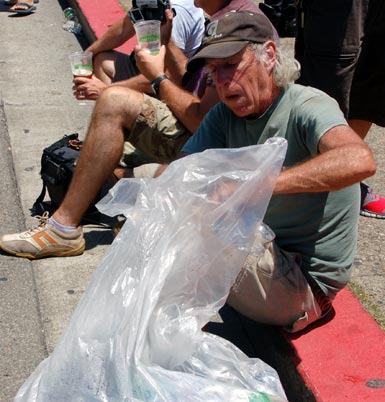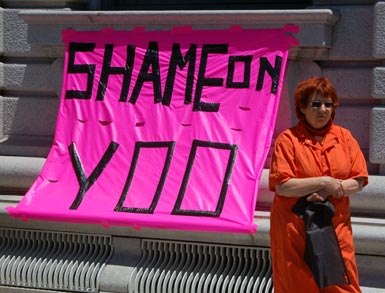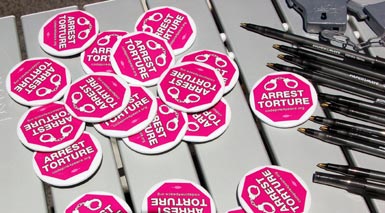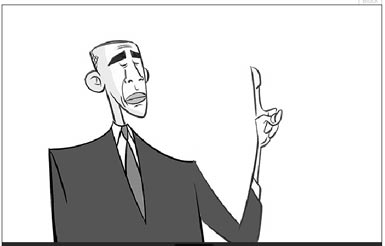 Demonstrators calling for a single payer health care system greet Health and Human Services Secretary Kathleen Sebelius today in San Francisco.
Demonstrators calling for a single payer health care system greet Health and Human Services Secretary Kathleen Sebelius today in San Francisco.So we are entering the time period when the national health care reform project will shake out. Or not. Congress is muttering -- louder. The President says we are going to do something. The citizens certainly hope so.
I'm not going to pretend I understand the minutiae of the various options. One of the ways that most of us are made to feel helpless by the current medical mess is that no one can understand all the profitable curlicues that the interested parties -- doctors, hospitals, insurance companies, drug companies, medical educators and researchers -- have built into the system. There seems to be something for everyone, except, too frequently, the patients.
But though I don't know all that much about healthcare reform, I do know something about politics. So, here are some political observations based on surveying the current landscape.
There is wide agreement that the existing "system" is completely broken, costs too much and will cost more, and is irrational. That's easy to point out. For example, today, in front of the American Association of Retired People, the President
boasted that he was pushing for a remedy for the "doughnut hole." The "doughnut hole" is the name for the lunatic compromise in the Medicare prescription drug benefit which means that, annually, recipients don't pay for the first $2700 they lay out, then have to pay the next $3400, then can turn to Medicare after $6100 has gone to pharmaceutical companies. Obama's fix? The government will provide half-off vouchers to be used in the "doughnut hole." Helpful -- but doing away with the whole jerry-rigged concept seems obviously more efficient. I guess that answer is too simple. Just as simply taxing us all and having the government pay our medical bills (single payer) is too simple. Even though that's more or less what
75 percent of us want.
And then, whatever they come up with has get through Congress. And we've got a Constitution far more designed to prevent radical mistakes than to enable necessary reform.
(Cynical description here.) A few Senators from tiny states can stop most anything. And all Senators need and value campaign contributions from the very companies that made the present mess and don't think there is anything to fix. Their bottom line is fine; who needs sick people?
So getting anything through Congress will be tough. When you think about it, only in two short bursts during the 20th century did really significant reforms come out of Washington. During the first phase of the New Deal, government took over making capitalism work which was radical indeed. What's forgotten is that civil society was so desperate amid bank failures and 25 percent unemployment, that there was serious talk in the mainstream media in 1933 about making the President a dictator. It required near complete systemic collapse to win the regulatory apparatus and safety net put in place back then.
The other radical episode was the passage of civil rights legislation in the 1960s. That took the major unrest created by the civil rights movement coming together with an accidental President who was a legislative genius. The latter is not what our governmental system usually produces. The qualities that make a good candidate -- overweening ambition, an extremely thick skin, a willingness to project confidence that may not be warranted -- are not at all the skills that make for legislative success. Lyndon Johnson could probably never have been elected President in his own right, because his great (frightening) talent was the manipulation of people and interests that results in legislation, rather than broad leadership. But thrust into office by the Kennedy assassination, he was able to make the Congress respond to the demand for full legal civil rights for African Americans and other people of color as perhaps no one else would have been able to.
It's not at all clear that times are bad enough, or our present President deft enough, to bring true reform of anything so broken as the U.S. healthcare morass. But we are about to find out.
The political moment does ensure that we'll get something, though it may be mostly curlicues and not much fix. And we can be sure that the Democrats and our President will tell us that they won a great victory for us.
This is partially because we've elected a community organizer. Organizers know you always have to assert that any smidgen of progress is a victory. When I worked for the United Farm Workers Union, we'd stand around waiting for our lead organizer to get off the phone with California, ready to twit him: "what's the victory today?"
Since the problem is dire, let's hope whatever emerges actually does some good. Some smart economists,
including Christina Romer, the chair of the Council of Economic Advisers in the Obama administration, argue that controlling health care costs is the only route to a fiscally sustainable future for the country. Not to mention that people get sick and die because medical attention is unavailable to them. It's certainly worth using all available tools of citizenship to keep reminding our legislators that ultimately they work for us, not for the insurance companies.





















































